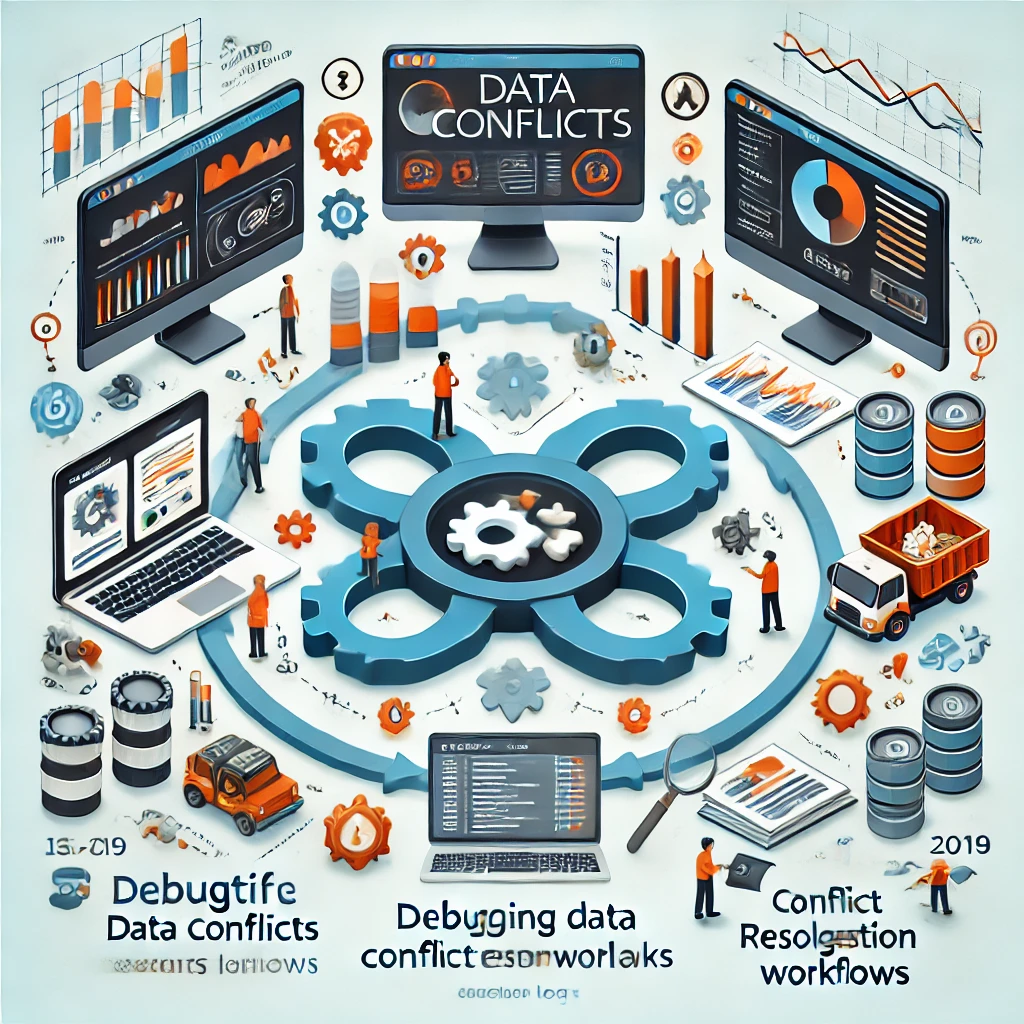Debugging Data Conflicts with Syncloop’s Monitoring Tools

This blog explores how Syncloop’s monitoring tools help debug data conflicts effectively, enhancing system reliability and user satisfaction.
Common Causes of Data Conflicts
- Concurrent Updates: Multiple users or systems updating the same resource simultaneously.
- Replication Lag: Delays in data synchronization across distributed systems.
- Schema Mismatches: Inconsistent data structures across APIs or databases.
- Latency Issues: Slow updates causing outdated data to overwrite newer changes.
- Integration Errors: Misconfigured APIs or middleware introducing discrepancies.
Challenges in Debugging Data Conflicts
- Real-Time Detection: Identifying conflicts as they occur in high-traffic environments.
- Root Cause Analysis: Determining the source of inconsistencies in complex workflows.
- Conflict Resolution: Applying effective strategies to reconcile discrepancies.
- Performance Impact: Debugging without disrupting API performance or user experience.
- Visibility: Gaining insights into data flow and interaction patterns.
How Syncloop’s Monitoring Tools Simplify Debugging
1. Real-Time Conflict Detection
Syncloop monitors data flows in real-time, identifying conflicts instantly.
- Features:
- Event-driven alerts for data mismatches.
- Visualization of conflicting records in dashboards.
- Benefits:
- Enables immediate action to resolve issues.
- Reduces the impact of conflicts on end users.
- Use Case: Detecting and resolving discrepancies in inventory counts during peak sales periods.
2. Detailed Logs and Audit Trails
Syncloop provides comprehensive logs for analyzing data conflicts.
- Features:
- Chronological records of API interactions and data changes.
- Detailed payload and metadata logs for each request.
- Benefits:
- Facilitates root cause analysis by tracing data paths.
- Simplifies identification of conflict sources.
- Use Case: Debugging mismatched customer profiles across CRM and ERP systems.
3. Conflict Resolution Tools
Syncloop supports automated and manual conflict resolution strategies.
- Features:
- Timestamp-based reconciliation for concurrent updates.
- Custom resolution logic using API orchestration.
- Benefits:
- Ensures data consistency with minimal manual intervention.
- Adapts to specific business requirements for resolving conflicts.
- Use Case: Reconciliating conflicting orders from multiple e-commerce channels.
4. Schema Validation
Syncloop validates data against predefined schemas to prevent mismatches.
- Features:
- Schema mapping tools for consistent data formats.
- Alerts for schema violations in API responses.
- Benefits:
- Prevents conflicts caused by structural discrepancies.
- Enhances integration reliability across diverse systems.
- Use Case: Ensuring consistent data formats in multi-region API deployments.
5. Latency Monitoring
Syncloop tracks data synchronization delays to address lag-induced conflicts.
- Features:
- Metrics for replication and response times.
- Alerts for excessive latency impacting data consistency.
- Benefits:
- Reduces the risk of outdated data overwriting newer changes.
- Optimizes performance in distributed environments.
- Use Case: Identifying and resolving replication lag in a global database.
6. Proactive Alerts and Notifications
Syncloop notifies teams of potential conflicts before they escalate.
- Features:
- Configurable thresholds for conflict detection.
- Real-time alerts via email, Slack, or other channels.
- Benefits:
- Minimizes downtime by enabling quick resolution.
- Enhances collaboration between development and operations teams.
- Use Case: Alerting teams to mismatched billing data in financial APIs.
7. Visualization and Reporting
Syncloop provides visual tools to analyze and debug conflicts effectively.
- Features:
- Graphical representation of data flows and conflict points.
- Exportable reports for historical conflict analysis.
- Benefits:
- Improves understanding of systemic issues.
- Supports decision-making with actionable insights.
- Use Case: Visualizing data conflicts in supply chain management systems.
Best Practices for Debugging Data Conflicts with Syncloop
- Monitor Continuously: Use real-time dashboards to identify conflicts early.
- Define Conflict Rules: Set thresholds and validation criteria to detect discrepancies.
- Leverage Logs: Analyze detailed logs to trace the origin and nature of conflicts.
- Implement Resolution Strategies: Use automated or manual methods to reconcile data inconsistencies.
- Test Schemas Regularly: Validate data formats to ensure compatibility across systems.
Real-World Applications
1. E-Commerce
- Use Case: Resolving discrepancies in product availability between online and offline stores.
- Benefit: Prevents overselling and enhances customer trust.
2. FinTech
- Use Case: Debugging conflicting transaction records in multi-region systems.
- Benefit: Ensures accuracy and compliance in financial operations.
3. Healthcare
- Use Case: Synchronizing patient records across hospitals and laboratories.
- Benefit: Improves care delivery and regulatory compliance.
4. Logistics
- Use Case: Identifying data mismatches in shipment tracking systems.
- Benefit: Enhances operational efficiency and transparency.
5. SaaS Platforms
- Use Case: Managing user data conflicts in multi-tenant architectures.
- Benefit: Ensures reliable service delivery and customer satisfaction.
The Future of Debugging with Syncloop
Syncloop is enhancing its conflict debugging capabilities with:
- AI-Driven Conflict Detection: Leveraging machine learning to identify patterns and predict conflicts.
- Blockchain Integration: Providing immutable audit trails for data consistency.
- Edge Processing: Reducing latency and conflicts by processing data closer to the source.
Conclusion
Data conflicts can disrupt API-driven systems, but Syncloop’s monitoring tools make debugging efficient and effective. With features like real-time detection, detailed logs, and schema validation, Syncloop empowers developers to resolve conflicts quickly and maintain data consistency.
By leveraging Syncloop, businesses can build robust, reliable, and conflict-free systems, ensuring seamless operations and superior user experiences.
An infographic showcasing Syncloop’s data conflict debugging tools, highlighting real-time detection, conflict resolution, and detailed logging for efficient troubleshooting.
Back to Blogs